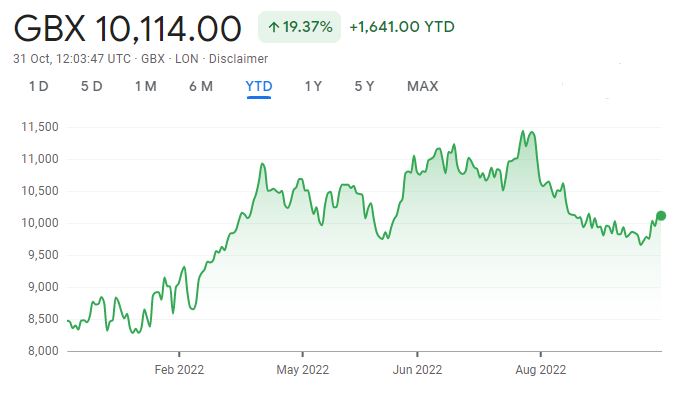Pharmaceutical company, AstraZeneca, caught the eye of many fund managers over the past year as it became the second most bought stock by IA UK All Companies funds in the 12 months.
The company became a household name when its Covid vaccine was used during the pandemic and it continues to perform well on the stock market even after infection rates have dropped.
Shares in AstraZeneca are up 19.3% since the start of the year as it makes an increasingly common appearance in portfolios.
However, some investors may be asking themselves whether it is worth jumping on the hype train or holding off as market sentiment inflates AstraZeneca’s share price to a peak.
Share price of AstraZeneca in 2022
Source: Google Finance
After playing a crucial role in the UK’s vaccine roll out, how much more does it have to offer? Julian Fosh, manager of the Liontrust UK Growth fund, said that the company has plenty more drug patents in the pipeline that can deliver robust revenues over the long-term.
AstraZeneca reportedly has 184 projects in the pipeline with 17 of their molecular entity ventures in late-stage development.
Fosh added: “AstraZeneca spends a large amount on research and development to discover ‘blockbuster’ drugs which, when patented, allow it to earn excess returns throughout the life of the patent – a return profile which is largely independent of economic cycles.”
Matt Evans, manager of the Ninety One UK Sustainable Equity fund, agreed that the company’s line-up of upcoming product launches presents an appealing outlook for future revenues.
In its half year report earlier this year, AstraZeneca announced that total revenue was up 48% year-on-year while operating profit had dropped 49%.
Evans said: “AstraZeneca has been on a journey of heavy investment and have seen the rewards come through with several new products achieving regulatory approval and seeing commercial sales pick up as they address many chronic conditions.”
Indeed, Evans said that the pipeline of new oncology products was particularly exciting, with several projects in late-stage development and nearing release.
Oncology products were a particularly profitable part of the business in the first half of the year, with sales in the area generating $7.5bn (£6.5bn), according to AstraZeneca’s financial report in July.
These high revenues could continue at a steady rate over the next few years, with the company forecast to grow at almost twice the speed of its peers, according to Evans.
He said: “Over the coming few years and as new products gain approval and begin sales, we should expect to see growth and cash flows increasing, allowing them to sustain healthy dividends but also continue to invest in research and development to develop more new products and medicines.
“Given Astra’s track record and focused investment programme we can see good evidence as to why this growth can be sustained.”
Laith Khalaf, head of investment analysis at AJ Bell, agreed that AstraZeneca had strong revenues post-pandemic and said that its resilient share price throughout turbulent markets this year offered investors some “decent places to ride out recessionary forces”.
Although its heightened popularity has boosted the share price significantly this year, Khalaf pointed out that its price-to-earnings ratio is lower than its 10-year average.
This may paint an appealing case for investing in AstraZeneca, but its $39bn (£33.8bn) takeover of Alexion Pharmaceuticals in July this year increased its debt burden significantly and could become a more expensive loan as interest rates rise, Khalaf warned.
Likewise, those looking to buy shares in AstraZeneca should be conscious of the indirect exposure they may already have to it in their portfolios.
Many UK equity and tracker funds have significant exposures to the company, so investors may have a sizable holding without knowing it.
AstraZeneca is the second largest company in the FTSE 100 index with a market cap of £156.9bn, according to the London Stock Exchange.
Khalaf said: “Investors attracted to the stock should consider their existing exposure before diving in – Astra is now the second biggest company in the UK stock market and will consequently make up around 7% of a typical UK index tracker fund.”






